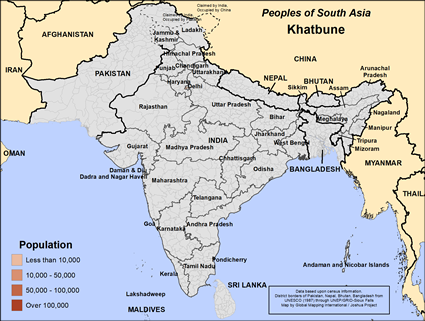The Sikh Khatbune people live primarily in the northern regions of India, particularly in Punjab. Historically, they have worked in agriculture and trade, contributing to the region's economy. Over time, the Khatbune have maintained a balance between traditional occupations and modern employment opportunities. Many families still farm, but younger generations have increasingly pursued education and careers in urban centers.
The Sikh Khatbune people primarily engage in agriculture, growing crops such as wheat, rice and maize. Farming remains an essential part of their livelihood, with many families working together to manage their farms. In addition to farming, some Khatbune families operate small businesses or have members who work in cities, contributing to a diversified income.
Their villages consist of extended families living close to one another, often in homes built from brick and concrete. Daily life revolves around farming, family responsibilities and religious practices. While many Khatbune continue to live in rural areas, the younger generation often seeks educational and professional opportunities in larger cities.
The Khatbune people follow Sikhism, a religion that emphasizes equality, service and devotion to God. They regularly visit gurdwaras (Sikh temples) for prayer and participate in religious festivals such as Vaisakhi and Guru Nanak Gurpurab. Daily prayers and the reading of the Guru Granth Sahib, Sikhism's holy scripture, are central to their spiritual lives.
In addition to their religious practices, the Khatbune people place a strong emphasis on community service (seva) and helping those in need. Religious values guide many aspects of their social interactions and decision-making, reinforcing their commitment to their faith.
The Sikh Khatbune people face challenges related to modernizing agriculture, access to education and healthcare. Many families still rely on traditional farming techniques, which can leave them vulnerable to environmental changes and fluctuating crop yields. Access to modern agricultural tools, irrigation systems and sustainable farming practices would improve productivity and economic stability.
Education remains a key need, particularly in rural areas where schools may lack resources. Expanding educational opportunities for children and improving access to higher education would help the community diversify economically. Healthcare access is also limited in rural areas, with families often traveling to larger towns for medical treatment.
Development programs that focus on improving agricultural techniques, expanding education and increasing healthcare services would greatly benefit the Sikh Khatbune community.
Pray for many from the Khatbune people to understand both God's judgment and his majestic glory and goodness.
Pray for loving workers to go to the Khatbune people, and for their hearts to be ready to receive their savior.
Pray for a chain reaction of families reaching families that result in thousands of new disciples who share their faith with others.
Pray for grace and truth expanding into their entire society as all believers learn to love others.
Scripture Prayers for the Khatbune in India.
Ethnologue: Languages of the World
Reports from Indian NGOs on Sikh communities
Academic research on agriculture and rural development in Punjab, India
| Profile Source: Joshua Project |











